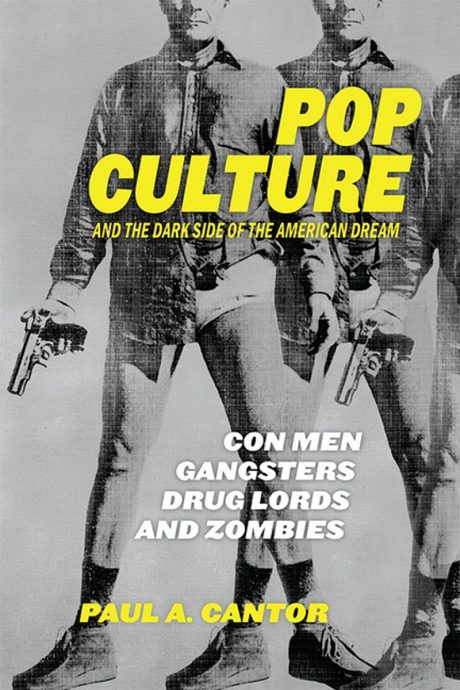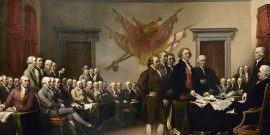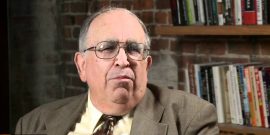Not so long ago, statesmen delivered speeches to reforge a sense of national identity by invoking the principles of the Declaration of Independence.
Paul Cantor and the Dark Side of the American Dream
Paul Cantor has a new book on popular culture, completing his long-term project on the American dream. His previous book, The Invisible Hand In Popular Culture, established how real the American dream is and how it connects freedom and success. His new book, Pop Culture and the Dark Side of the American Dream: Con Men, Gangsters, Drug Lords, and Zombies, examines the dangers of individualism: apathy and violence; the yearning for success whatever the cost; and the ongoing failure of confidence in America.
In five chapters, Cantor tells the story of America’s new birth of freedom after the partial victory of natural rights and political equality in the Civil War. He starts with Mark Twain’s warning, in The Adventures of Huckleberry Finn, that whenever the promises of freedom fail a community, the yearning for old European aristocracy will return. We have an unacknowledged problem when it comes to recognizing each other’s dignity and whenever we fail to deal with it, people choose abject gaudiness, con men who are only playing at royalty.
Since we know from our own times how obsessed the American people can be with the domestic scandals and banal lives of English royalty, we can easily believe Twain had a point. But that point generalizes to our love of gaudy celebrities who ape those Old World Aristocracies. Twain feared that the natural Americans, who may be vulgar, but are not parasitical, would be enslaved in their minds and souls after having won the liberty of their bodies. What if History returns with a vengeance? What if not even the New World is safe from class strife? Here it is important to note that Twain was a lifelong enemy of Shakespeare—he wanted Americans to stop being impressed with European elites, because reproducing their habits of mind would cause European political crises to emerge among us.
Since Twain, many artists in times of trouble have tried to warn America that a reasonable anger at our institutions, both in government and business, could turn into something much more dangerous. Cantor turns to a rare comic attempt to defuse popular anger: W.C. Fields, the populist wit and natural enemy of moralists like the neo-Puritan Temperance Leagues and Prohibitionists. Fields stood up for the freedom to get drunk and misbehave in order to turn what could become violence or partisanship into mockery.
Fields was Hollywood’s wise fool and Cantor loves him because he shares his mischievous turn of mind, and understands that the immorality of vulgar humor is preferable to mob violence. One way or another, Americans will assert their freedom from moral policing of their behavior. With Fields, Cantor finds an artist who loves Americans just as they are and will teach them by fun and pleasure rather than suffering. The desire for drink and the desire for comedy are natural allies, and from the point of view of political prudence, comedy is a better way to calm down feverish desire than is moralism.
From there on, Cantor’s artists turn tragic. First, Mario Puzo and Francis Ford Coppola’s Godfather movies retell American history: from the immigrants’ arrival in the East, where Sicilians try to reconstitute a Little Italy, to the Westward expansion to Las Vegas. The land of opportunity turns out to involve a lot of crime and gambling—that is, obviously unjust gains derived from others’ honest work. People from other countries need to be educated in American liberty and natural rights in order to truly integrate and those too proud for this foreign-to-them discipline might achieve success by perverting American entrepreneurship. Crime is not unknown in America—and it offers some criminals an opportunity to attempt regime change, to revert from modern liberty to pre-modern inegalitarian politics. Crime is about honor as much as gain and therefore what’s illegal among us might just be an honored way of life in the Old World.
Thus, the Corleone family brings tragedy to the New World. Immigrants often see America as great, too mobile to predict or trust, or even dangerous. They are often poor, unprepared, and American freedom means they have to figure it out for themselves, since Americans are free to avoid them or even, in the ugliest cases, exploit them. The government institutions that might be expected to help are often remote, unhelpful, or even corrupt. So crime becomes a form of self-defense in the face of American greatness without charity. Cantor shows that although it may seem to abuse our pieties to tell stories like The Godfather, it affirms the comprehensive claims of natural equality, which extend to those strangers we choose to accept as immigrants. They remind us we freely bind ourselves to extend civil friendship to them. So their tragedies become ours. The Corleones are obviously trying to integrate, but they necessarily fail. Their difficulties cause them to fall back on Old World ways of thinking and acting which in the New World are only intelligible as crime.
With Twain and Fields, individualism only meant the ruggedness needed to make one’s own way, while acknowledging that there’s a lot of suffering among the lower classes. With his central chapter on Coppola, however, Cantor begins a new period in American storytelling—the villains become protagonists, anti-heroes, and then tragic heroes. The confident individualism of America, the can-do attitude, turns into what Tocqueville called individualism—the lonely, helpless suffering of the poor and the agony of proud men. This is the timeliest insight of his book and it’s unfolded most carefully in his long chapter on Breaking Bad, which he calls The Macbeth Of Meth.
Cantor calls the Godfather movies the best in cinema history and he next calls Breaking Bad the best in TV history. As a writer on Shakespearean tragedy, he proposes to explain in witty, insightful prose why excellence is connected to tragedy. Now, we’re not Shakespearean aristocrats, but we do love many forms of excellence as Americans and Cantor dedicates this chapter to showing why so many Americans, especially men, find middle class lives, where excellence is missing, disappointing. His detailed and visionary analysis of Macbeth in comparison with Walter White and his place in a post-2008 America where vast institutional failure scares and angers people is a great contribution to what we need to learn to deal with our political and cultural crises.
It is a rare scholar who unapologetically loves what Americans love. Cantor adds to that love an educated, searching respect for the greatest storytellers in America. He explains what is moral and what’s aesthetic in our entertainment and therefore how artists aim to educate by fiction. He aims to prove that ugly stories, not just happy endings, can serve the public good. In his telling, even the zombie apocalypse of The Walking Dead should be seen as a test of national character that strengthens our belief in natural rights and human equality instead of shaking it.
The most daring interpretation appears in Cantor’s fifth and final chapter: The Walking Dead as a Western. After our technology and our institutions fail us, will we stay American? Will we stay human? The Walking Dead shows that it’s possible: despite horror beyond tragedy, an American community a la Wagon Train forms, searching for freedom and peace, and Americans learn once again to prize character, to educate for self-reliance and community at the same time, and to respect again manly virtues, as well as the faith in natural equality those virtues should serve.
This examination of the dark side of the American Dream reveals the possibility of losing the dream or saving it. He guides readers into the visions set forth by great American artists and adds his own knowledge of political philosophy to reveal the underlying questions of natural right and to reaffirm American character as the true repository of our most important inheritance, visible even in tragedy—even or especially when institutions and technology fail us. It’s rare to have such a witty book that is at the same time edifying—proving that Cantor is, as he says, a believer and practitioner of the American dream.



